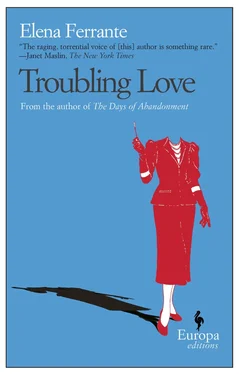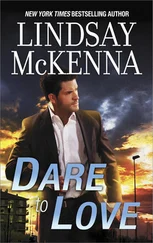“I remember everything or almost everything. Only the words are missing. But I remember the horror and I feel it again every time someone in this city opens his mouth.”
“I thought you didn’t remember,” he muttered.
“I remembered but I couldn’t tell myself.”
“You were a small child. How could I imagine. . ”
“You could imagine. You were always able to imagine when it was a matter of hurting her. You went to Amalia to see her suffer. You told her it was Caserta who came to you on purpose to tell you about the two of them. You said that he had told you about me, about how I had lied, forty years ago. You unloaded all the blame on her. And you accused her of having made me a sick little liar.”
My father tried again to get up from his chair.
“You were repulsive even as a child,” he cried. “It was you who pushed your mother to leave me. You used me and then you threw me away.”
“You ruined her life,” I retorted. “You never helped her to be happy.”
“Happy? I was never happy, either.”
“I know.”
“Caserta seemed better than me. You remember the gifts that came for her? She knew perfectly well that Caserta sent them in his own interest, to get revenge: today fruit; tomorrow a book; then a dress; then flowers. She knew that he did it so that I would be suspicious of her and kill her. It would have been enough if she had refused those gifts. But she didn’t. She took the flowers and put them in a vase. She read the book without even hiding it. She put on the dress and went out. Then she let herself be hit till she was bleeding. I couldn’t trust her. I couldn’t understand what she was hiding in her head. I couldn’t understand what she was thinking.”
Pointing to the table behind him, I murmured:
“You aren’t able to resist Caserta’s gifts, either.”
He turned to look at the painting, uneasily.
“I did it,” he said. “It’s not a gift. It’s mine.”
“You wouldn’t be capable of that,” I said.
“I did it as a young man,” he insisted, and I had the impression that he was imploring me to believe him. “I sold it to the Vossi sisters in 1948.”
I sat on the bed without his asking me, next to his chair. I said to him gently:
“I’m going.”
He started.
“Wait.”
“No,” I said.
“I won’t bother you. We can get along together. What kind of work do you do?”
“I draw comic strips.”
“Does it pay well?”
“I don’t have many needs.”
“I’ve got money put aside,” he repeated.
“I’m used to living frugally,” I said. And I thought of chasing him out of the childhood part of my memory by embracing him, here, now, to make him human, as perhaps he was, in reality, in spite of everything. I didn’t have time. He struck me again, in the chest. I pretended not to feel any pain. I pushed him back, I got up and went out without even glancing at the other end of the hallway.
“You’re old, too,” he yelled after me. “Take off that dress. You’re revolting.”
As I was going toward the door, I felt that I was precariously balanced on a sliver of the floor of the house of forty years before: it could still support my father, his easel, the bedroom, but I was afraid that my weight would cause it to collapse. I hurried out to the landing and shut the door carefully. Once in the open, I looked at the dress. Only then did I discover, with disgust, that at the level of the pubic area there was a large stain with a whitish edge. The material at that point was darker and, if you touched it, seemed starched.
I went along the street. Around the corner I easily recognized the Coloniali, which had belonged to Caserta’s father. It was shut up by two wooden boards crossed over a metal shutter that curled up on one side like the corner of the page of a book. Above, there was a mud-smeared sign on which one could make out: “Video Arcade.” A cat with yellow eyes, the tail of a mouse wriggling in its mouth, emerged from the black triangle made by the broken shutter: it looked at me in alarm and then slipped cautiously out between the boards and the shutter and went off.
I kept going beside the wall of the building. I found the vents for the cellars. They were exactly as I remembered them: rectangular openings a foot or so from the pavement, each with nine bars across and covered by a fine screen. From them came cool air and a scent of dampness and dust. I looked inside, shading my eyes, trying to get used to the darkness. I saw nothing.
I went back to the entrance of the shop then, and observed the street. There was an untroubled clamor of children in a street that, with its poverty, was not reassuring at twilight. The hot air was saturated with a strong smell of gas, coming from the refineries. The water in the puddles was crowned with swarms of insects. On the sidewalk opposite children of four or five raced on plastic tricycles. A man of about fifty seemed to be wearily watching over them, his pants clinging to his belly under a bulging dirty yellow undershirt. He had massive arms, a long, hairy torso, short legs. He was leaning on the wall, next to an iron bar that didn’t seem to belong to him: it was almost a meter long, sharpened at the tip — part of an old gate, left there by some boy who had recovered it from the garbage to play dangerous games. The man was smoking a cigar and staring at me.
I crossed the street and asked him, in dialect, if he could give me some matches. He took out of his pocket a box of kitchen matches and offered them to me, gazing ostentatiously at the stain on my dress. I took five, extracting them one by one, as if his look didn’t embarrass me. He asked tonelessly if I also wanted a cigar. I thanked him; I smoked neither cigars nor cigarettes. Then he told me that it was a mistake to go around alone. The place wasn’t safe: there were some bad people who even bothered children. He pointed at them, grabbing the bar and giving it a rapid twist in their direction. They were insulting one another in dialect.
“Sons or grandsons?” I asked.
“Both,” he answered peacefully. “I’ll kill anyone who tries to touch them.”
I thanked him again and went back across the street. I climbed over one of the boards, bent down, and entered the dark triangle beyond the shutter.
I tried to orient myself as if the counter with the exotic scenes painted by my father so many years before were in front of me. I had felt it as huge, so high that it was at least two inches above my head. Then I realized that I had grown more than two feet since the time when I had lingered in front of that object loaded with licorice and sugared almonds. Immediately the wood and metal wall, which for a moment had been almost six feet high, slipped down and stopped at my hips. I walked around it cautiously. I even picked up my foot to climb onto the wooden platform behind the counter, but in vain: naturally, there was neither counter nor platform. I slid the soles of my shoes along the floor, groping my way, and encountered nothing, only debris and a few nails.
I decided to light a match. The place was empty and there existed no memory capable of filling it: only an overturned chair separated me from the opening that led into the space where Caserta’s father had kept the machines for making sweets and ice cream. I let the match fall to keep from burning myself and went into the former pasticceria . There, though the right wall was blank, the left had three rectangular openings high up, barred and screened with mesh. There was enough light so that I could distinguish clearly a cot and, on it, a dark body, lying as if it were asleep. I cleared my throat to make myself heard but nothing happened. I lighted another match, approached, and reached out a hand toward the shadow lying on the bed. As I did so one hip bumped against a crate of the kind used to pack fruit. Something tumbled onto the floor, but the outline didn’t move. I knelt down, with the flame grazing my fingertips. On all fours I hunted for the object I had heard falling. It was a metal flashlight. The match went out. With the beam of the flashlight I could discern a black plastic bag, left lying on the bed like a person sleeping. Some old underpants and an undershirt of Amalia’s were strewn on the bare mattress.
Читать дальше












